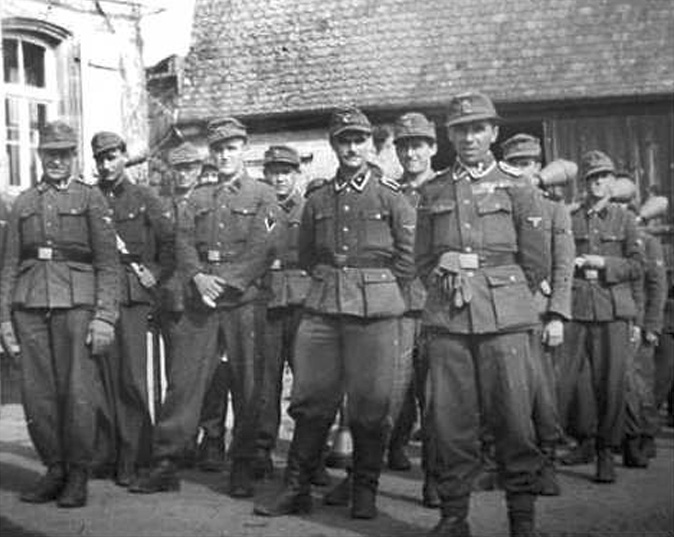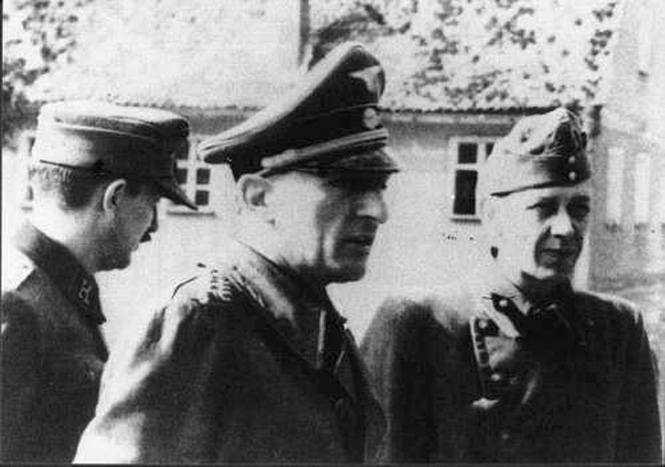Interview with Janos Moog, veteran of the 25th Waffen Grenadier Division of the SS "Hunyadi" (1st Hungarian), Rechnitz, Germany, 1989.

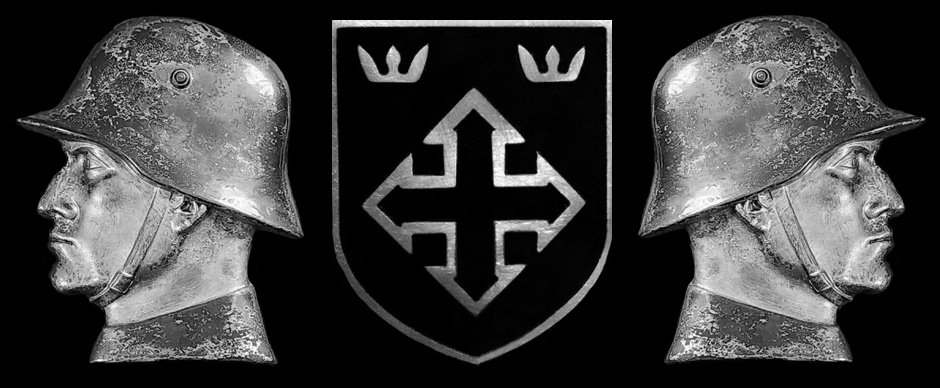
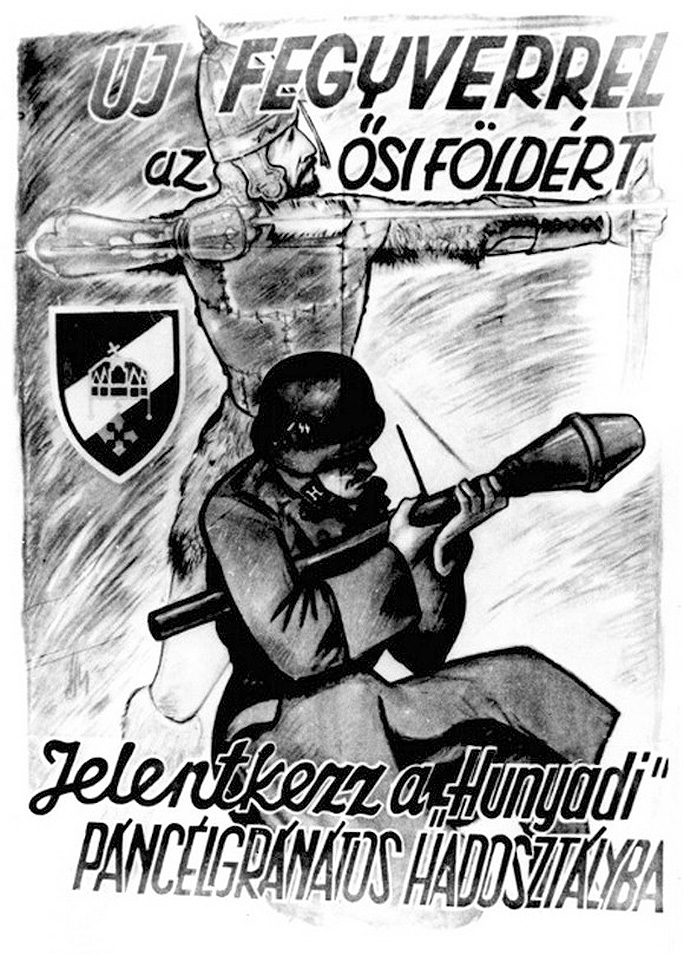
Interview with Janos Moog, veteran of the 25th Waffen Grenadier Division of the SS "Hunyadi" (1st Hungarian), Rechnitz, Germany, 1989.



Janos: First things first, I never joined the German SS and I did not fight for Germany. I was a Hungarian citizen and was drafted into the army in 1944 to fight the Russians. I was an 18-year-old student then and my country was overthrown by the Germans to keep us in the war. The people were mainly for Germany as we knew what a Russian victory would mean for us. The Russians entered Hungarian territory and started doing what they are known for, rounding up dissenters who were never heard from again. I will tell you the mood was not against Germany, we knew Hitler was right and he was only trying to defend Europe from the evils of communism. Some did not like the heavy hands the Germans used but we understood the war brought out extreme measures. Many of my class went to enlist or were drafted. You had to have a parent's permission if you volunteered before 1944.
I was ready to report when the Germans helped overthrow [Miklós] Horthy, and installed a loyal government. I was assembled with many others and told a grave danger was coming from the east, and every able-bodied person was needed. Even the girls were used for war work, either caring for the sick, making food, or factory work. It was a very trying time for Hungary; we cast our lot with Germany and could not back out when the chips were down. Our leader announced a new formation of the SS which was an elite unit, it would be only Hungarian, and would speak Hungarian. We would be used to only fight the Russians, and would receive German weapons and equipment. Everyone had to agree to this, those who did not were sent to the German army or to militia units. I agreed to serve in this Hungarian division, and we wore a color patch honoring Hungary and our national shield on our sleeve. We were not German, we were Hungarian, being trained and organized to fight the Russians when they came. I remember the civilians came out to see us off and gave what little they had as send off gifts. Our train was going to take us to Neuhammer which is by Reitschen.
We set up in quarters on a large military base. We were allowed to go out and sightsee the area, I liked to fish and there were large lakes nearby to meet my needs. When our training started I did not have this luxury very often. I was able to meet a girl here however. There was a childcare camp nearby for evacuated children, and she was a BDM [Bund Deutscher Mädel, or League of German Girls] helper here. I met her while fishing; she was hiking and stumbled upon me.
She spoke Hungarian poorly, as I spoke German poorly, so we had to make do. She invited me to a picnic lunch and we enjoyed the weather while trying to converse. I would see her on the weekends sometimes and she was worth trying to learn German for. Because training was long and intense we never really had the chance to form a relationship. When we had to evacuate, as did she, I received a kiss, my first ever and I always wondered what happened to her. She was from Graz I remember.
Hungarians did not consider wearing German uniforms as fighting for Germany?
Janos: No we did not. Germany was our ally and we thought of them as comrades in arms, but we were different. Hungarians thought of Germans as sometimes overbearing and arrogant, but for the most part we got along well. I saw very few problems regarding the treatment of our men. There were some arguments I remember when a German would tell us to do something that was not part of our orders.
Our officers spoke German and would diffuse the situation usually, but one day a fight broke out. An older NCO was courting a girl on the base who was a washer; one of our men had paid her a compliment and patted her behind. He saw this and came barreling at him like a bull. They were both arrested for a few days to cool off.
We wore Hungarian uniforms but had German weapons and equipment; we also wore the famous German helmet. We were treated just like any other unit in the Waffen-SS. This is why I say we did not fight for Germany. We fought for something bigger, for Europe as a whole,
We understood we were fighting to stop communism and those who defended it. This is why many of us joined the Germans to help, we joined them to save our country. Rumors of bombing raids, looting, and rapes by the Russians were making us anxious to get at them. I know many comrades were angry that putting the division together was taking so long. Then we had to conduct maneuvers with each unit to work together.
Before we went into action we held a parade where high SS leaders came to wish us well and see us off. It was a pretty big affair, and Himmler even sent orders for a nice dinner to be served, and a statement was read from him where he thanked us for coming to the aid of Europe and defending our culture. We were honored that so many came to thank us for continuing the fight.
[Above: Note the 'H' collar tab, this stood for the famous Hungarian hero János Hunyadi, who was a Hungarian general and leading commander against the Turks in the 15th century and governor of the kingdom of Hungary from 1446 to 1452.]
Can I ask if you ever saw any evidence of war crimes committed by the Germans or the Allies?
Janos: I would have to honestly tell you no. I was in the war at the end so I am not the best person to ask. War is nasty business and is unfair to those fighting. I did not hear of any accusations until after the war. The Americans talked about how bad Hitler was and how we were fighting for evil, killing Jews, and destroying Europe. We of course did not want to hear this because we destroyed nothing, and had nothing to do with Jews.
I spoke to Germans who told me they saw the aftermath of Allied crimes, like murdered prisoners and civilians. I saw the aftermath of bombing raids and the dead, but that was about all. I saw no examples of the Germans committing crimes either. We took prisoners, as did they, and had orders to treat them well.
The Soviets today accuse my country of helping kill Jews, but this is nonsense.
The political arm of our government [The Arrow Cross Party] rounded them up and allowed the Germans to send them to camps. I will say the Jews in Hungary were not many, but they had the reputation of siding with the reds, and actively helping them. Just like in 1956, Jews were prominent in the red movements and the Germans did what our former leader would not, kick them out.
When did your division go into action and what was it like for you?
Janos: Oh boy, let me think. I think it was while on the trains going to training, planes attacked us and killed 20 men I believe. This was before we ever got to fight back, we were sitting ducks. Many became wounded before even taking the oath to the Führer and our leaders.
Then in February 1945, the base commander at Neuhammer put us on alert and we had to prepare to defend the base and town. The Russians were only 60km away they said, and we could hear sounds of battle. We had to rotate to a river to form a defensive ring. I was the last to go, as it was mostly older men with combat experience who were sent first.
I remember we had little in the form of weapons and our leaders were very upset. Part of our men had been sent away for officer training, which later I learned were killed in Dresden. Our unit received anti-tank guns and assault artillery. We were good at hiding these guns by trees, and camouflaging them so they could not be seen for many meters. This paid off later at the end when we knocked out American tanks that had no idea what hit them or where it came from.
We kept up our training regimens while all this was going on and each day the mood was worse as the Germans could not get supplies to us. Our supply unit had to go out to search for food on some days; luckily they found enough to keep us fed. The local Gauleiter sent someone to see who was stealing crops and animals. It was a bad time for us.
When he saw who we were he dismissed the complaints and our leaders met with him to ask for help. We got it at the next base we came to. It was decided to leave Neuhammer and when we arrived at the next base we had loads of weapons of all kinds, and food. That Gauleiter pulled strings it seemed and we now had what we needed.
We had to always be careful when moving as the Allies were everywhere. They shot at anything on the ground, whether it was military or civilian. When our truck went out for supplies or training we had to post a rider on the hood to look up at the sky. As we moved west we saw evidence of them shooting at the roads and destroying many vehicles.
Our first real taste of battle was against Patton and his Third Army; we had to face Sherman tanks, which our front line knocked out. I believe this was now late April when we went into action, it took us that long. Many men were angry we were not fighting the Russians to save our land, but the Americans were the enemy too, so in the end it made no difference.
We were formed together with our sister Hungarian division, and moved into Austria to regroup and reorganize. The Hungarian government issued orders to us now as the Germans had by now collapsed into small battle formations with no real headquarters. Our fighting against the Americans was very short, and except for knocking out some tanks, pretty uneventful.
We spent more time withdrawing than actually fighting the enemy, our flak sometimes engaged the planes while we sat and watched. There were small battles in the hamlets that produced casualties, but mostly the Americans withdrew to avoid losses, then we would retreat to form better lines.
What was the end of the war like for you?
Janos: Well, by May of '45 we were finished. We knew our homes had been taken by the Russians, and the war was lost. We yearned to return to our families as we were fearful of what it might mean that we came to help Germany, and stayed in the war. Our commander received word to surrender to the Americans, and he did just that.
I remember seeing the Americans arrive in a jeep looking like cowboys and they went in to speak to our commander, who then came out to our large throng, and announced it was over. We would be going home soon. We were somewhat lucky in that our new government made peace with the Russians and told them we had been forced to fight for Germany, and had no desire for war.
Many of us disagreed with this, but it was easier to take, knowing we could go home again and see our families. We were assured no one would face revenge, which was a lie. Many men were later sent to camps, and some of our leaders were shot when the NKVD [Interior Ministry of the Soviet Union] started investigating. I was lucky to escape being tattooed as SS and to escape being taken by the Russians.
Some of my unit stayed here in the former Reich and settled, or left for other countries once united with families back home. Overall the Americans treated us well and made sure we had food and medical care, they just said we were forced to fight them so all was forgiven. They were curious people, they treated me well, but I am hearing more and more that others weren't treated well at all.
Many Germans I met told of abuse, and the other foreign volunteers of the Waffen-SS suffered worse fates. When I returned home it was somber and I was kept hidden by my family until it was decided to leave for the west as the Russians were rounding up all those who disagreed with their rule. Many Jews came back to exact revenge on the people as well.
I remember hearing about roving armed bands seeking collaborators, former comrades, and anyone who spoke out against them. Many Hungarians were sent to camps or just disappeared forever, we were glad to get out.
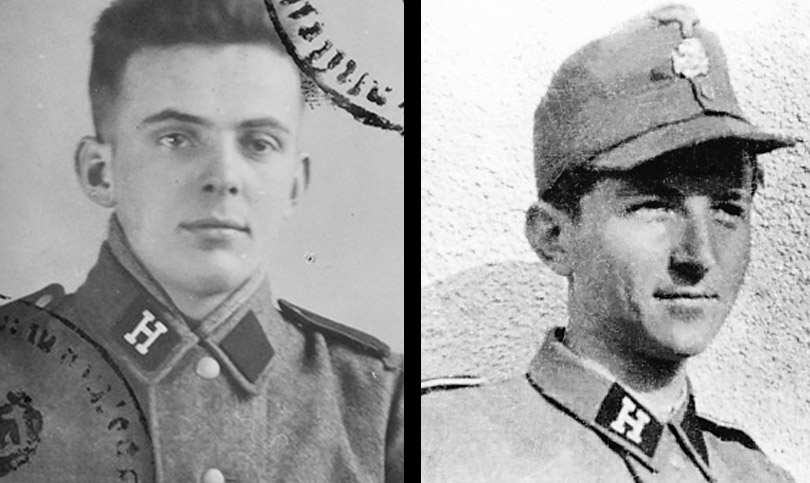
[Above: Men of "Hunyadi".]
[Above: This is the commander József Grassy (middle) of the 25th Waffen Grenadier Division of the SS "Hunyadi".]
